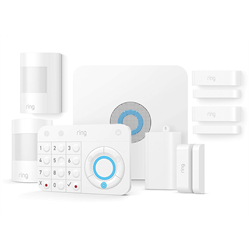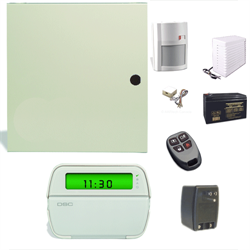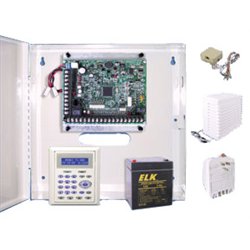Best Security Alarm Systems for Home and Business
Alarm systems provide peace of mind and help protect your home or business against burglars and vandals. They can act as a deterrent and may scare away a would-be thief before they try to break in or when they hear the siren. Most alarm systems can either contact the home owner directly (self monitored) or they may be professionally monitored.
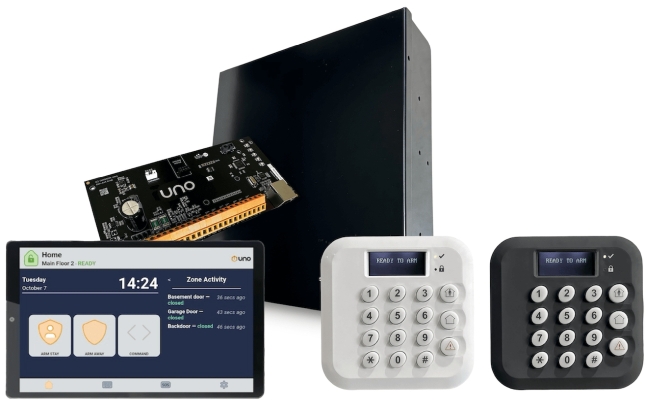
LEARN ABOUT SECURITY ALARM SYSTEMS FOR HOME AND BUSINESS
Selecting the right alarm system can seem like a daunting task but this document should provide some insight to make the decision much simpler. Doing it yourself means taking some time to research and plan your system but the rewards are a custom system that suits your unique needs plus bragging rights when showing it off to friends. If you need help you can reach out by email or phone and we'll be pleased to assist.
WIRED vs WIRELESS ALARM SYSTEMS
When discussing wired vs wireless alarm systems we're referring to the sensors and whether they are connected to the alarm system by wires or without. The term may also be referencing wired vs wireless keypads. Sensors are typically used to detect when a door or window opens, when someone walks by (motion), when a window is broken (glass break). Wired security sensors are excellent where one has the skill to run wiring to all panel, keypad and sensor locations. This is more practical with new construction, unfinished homes or basements. Wired sensors are typically less expensive and don't require batteries so they always work with virtually no maintenance.
Wireless sensors are much faster and easier to install but they are typically more expensive and the batteries need to be replaced occasionally. Often times the additional cost of the sensor is less important than the time and labour saved in trying to run wires. A wireless sensor may be installed in 5 or 10 minutes while it could take hours to run wires and drill holes to install a wired sensor.
COMMUNICATION FOR ALARMS AND ALERTS
When the alarm is triggered, a siren(s) will typically sound to let occupants know about a problem and hopefully scare away the intruder. An outdoor siren or strobe may be used to alert neighbours.
Additionally the system can potentially alert the homeowner via a call, email, text message or pop-up notification on an app. These notifications are dependant on the system's capabilities and options installed.
Traditionally alarms used a POTS (plain old telephone system) phone line to call a central station (see below). Or a voice dialer may be added to an alarm system and the dialer will call and play a message to the programmed number(s). Phone lines are rarely used any more as homeowners ditch them in favour of voip or cell phones.
Newer systems may use the Internet to communicate to a self monitored cloud system or to a professional monitoring station. Internet connections in most major cities are quite reliable. But many home and business owners may opt for cellular communcation as primary or backup. Keep in mind however that cellular communication will require paid monitoring which will include the cellular data needed.
SELF MONITORED ALARM VS PROFESSIONAL MONITORING STATION
Many customers prefer to be notified directly in case of a security event. Self monitoring can provide peace of mind and in some cases the system can be armed and disarmed remotely as well.
However there are some limitations to self monitoring. The home owner may be out of town, on vacation or unavailable when the alarm system tried to contect them. Or they may be in a bad cellular coverage area where the phone doesn't work. If the system is being used to monitor for fires, will you hope you're available and the message isn't delayed? Or would you rather know that a 24/7 monitoring station will call the fire department for you?
Many people feel that professional monitoring isn't worth it due to cost or because the police will be too slow to respond or will not respond at all. Most insurance companies will offer a discount on their premium if a professionally monitored alarm is installed. Additionally, the monitoring company can be instructed to call the homeowner, neighbour or friends in case of an alarm. Or a paid guard service may be dispatched for a fee.
INSTALLER SKILL LEVEL
Truth be told, ANY alarm system can be installed by an end user given enough time, patience, knowledge and skill. Several of our alarm systems are squarely aimed at simple do-it-yourself installation so that practically anyone can install and configure them in no time at all. These tend to be wireless systems. With the more advanced or hardwired systems and those with professional level features, more patience and skill will be required. In some cases the user may choose to have the system professionally installed and programmed to save time and ensure performance.
WHICH ALARM SYSTEM DO I CHOOSE?
With the above factors in mind, here's a brief overview of our most popular alarm systems, their main features or advantages, and where they may be applicable.
The Ring Wireless alarm system is a great home alarm offering self and professional monitoring using an iOS or Android phone app. The apps allow for arming, disarming, alerts and status. The Ring Home Alarm is a good choice for apartments, condos and small to mis sized homes. The system is available as a starter kit including the main alarm, motion sensor, door/window sensors and remote. It connects to your home's WiFi network and uses Internet for monitoring and control. The Ring Plus paid subscription provides cellular backup as well as professional monitoring. The Ring Wireless Alarm can be expanded by adding Ring security cameras, Ring doorbell and select options like a ZWave lock.
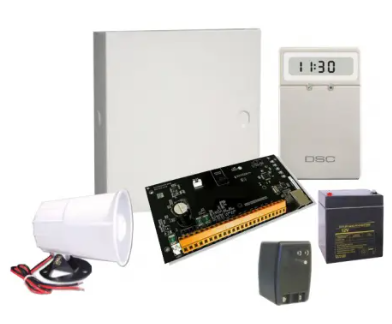
New for 2024, the UNO alarm is a hybrid wired and wireless security alarm system that can be self monitored via a free iOS or Android app - and also has paid 24/7 alarm monitoring available as an option. UNO is a great fit for homes and businesses alike with ample expansion. UNO works with Alexa and Google voice assistants and can integrate into many smart home ecosystems. It comes stanard with 8 wired zones (sensor connections), expandable to 128 and also supports optional wireless expansion options. UNO is meant for a more advanced do-it-yourself installer or you can have it installed by a pro. It's simple to use, and initial setup is accomplished using a web browser.
DSC security systems are aimed primarily at pro installers and can be operated by pretty much anyone. Pro level installers may also be able to set up a Neo system. These systems are suitable for homes and businesses. Installation and programming are somewhat technical but we do have some knowledgebase articles to assist and there are some excellent user forums with lots of information if you are willing to take the time to learn. DSC Neo systems can be used as a local alarm only. For remote access and you'll need to obtain an Alarm.com subscription, and pro monitoring is available through security companies.
Elk is our flagship alarm and automation system designed for mid to large sized homes, businesses, commercial and warehouse properties, and those wishing to do more with their alarm system. It can be self monitored or professionally monitored through your choice of monitoring stations and security companies. The Elk M1 Gold comes standard with 16 wired zone inputs, expandable to over 200. M1 can also support several styles of wireless sensors by adding the appropriate receiver. Choose from Elk's own 2-way wireless sensors, Interlogix or Honeywell frequencies. Elk M1 Gold can be self monitored using an old school phone line or Internet based apps. It has built-in voice and alarm announcement for announcing zones or events. Advanced rules based if-then programming can turn the system into a powerhouse automation controller. M1 can integrate with smart home systems like Home Assistant or Hubitat and can also support many different smarthome products directly. These systems are powerful enough to be used for almost any environment including access control. If you can think of it, you can probably do it with Elk.
Still need help? No problem, just contact us online or by phone!




